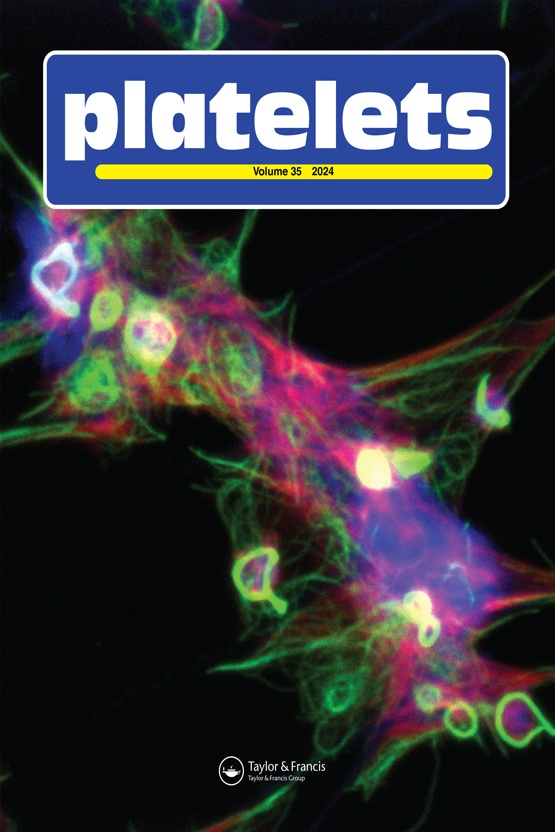Submit a Manuscript to the Journal
Platelets
For an Article Collection on
Pharmacological Targeting of Platelets: Insights and Interventions of the Past, Present and Future…
Manuscript deadline
25 July 2024


Article collection guest advisor(s)
Dr. Gavin Jarvis,
University of Sunderland, School of Medicine
[email protected]
Mr. Bob Humphries,
Platelet Services Ltd
[email protected]
Pharmacological Targeting of Platelets: Insights and Interventions of the Past, Present and Future…
Though small and anucleate, the platelet is a fascinating and sophisticated cell. In addition to being a key component of the haemostatic system and agents of arterial thrombosis, platelets also contribute to inflammatory and immune responses and the pathogenesis of tumour metastasis.
Platelets have been in the vanguard of pharmacological innovation and drug discovery for the best part of a century: aspirin was proposed as an antithrombotic in the 1950s; abciximab was (almost) the first therapeutic monoclonal antibody, approved in 1994. However, not all has been success; oral GPIIbIIIa antagonists represent a significant and expensive failure in drug development. Furthermore, adverse platelet reactions to current and investigational drugs, biological agents, and vaccines can undermine therapeutic value. Many diverse pharmacological targets on and in platelets have been proposed as being biologically and therapeutically significant and yet, in 2023, antiplatelet drugs act on a limited number of targets: cyclooxygenase, integrin αIIbβ3, and the P2Y12 receptor predominate. In the future, they may be joined by GpVI, PAR-1, and others.
Why do some targeting strategies succeed and others fail? Are there factors that predict success? What can be learned from targets that do not fulfil their promise? Identifying novel targets for antiplatelet therapy is widely cited as justification for pharmacological investigations; however, are there other benefits to pursuing this research?
Platelets are no longer considered only to contribute to haemostatic function and thrombotic disease. Insights into their roles in innate and adaptive immunity and cancer have opened new perspectives on platelet function, and with this, a deeper pharmacological understanding, and novel opportunities for therapeutic intervention beyond the domains of haemostasis and thrombosis.
We hope to attract a diverse range of articles for this Collection, including updated reviews of classic topics, insights into future treatments as well as speculative research on emerging biological mechanisms and innovative therapeutic strategies. The overarching theme is platelet pharmacology as a vehicle for treating and preventing disease, and as a lens for understanding physiological, pathological, and toxicological mechanisms in any body system.
We particularly hope to receive contributions that can address the following topics:
- The current position of and future possibilities for well-established therapeutics, including aspirin, and inhibitors of GPIIbIIIa and the P2Y12
- Novel targets and targeting strategies, and why they may succeed therapeutically, for example, GpVI and PROTACs.
- Long forgotten therapeutic hypotheses, and how these have furthered our understanding of platelet biology and refined (or not) approaches to drug discovery and development.
- Opportunities that pharmacological targeting of platelets bring for understanding of and intervention in domains beyond haemostasis and thrombosis.
- Mechanistic insights into toxicological effects that involve platelets, for example, VITT and drug-induced thrombocytopenia.
Finally, we are keen to attract articles from a diverse range of contributors, disciplines, and geographies: venerable professors and enthusiastic beginners; those who have spent a lifetime studying platelets and those who are new to the party; both famous and obscure institutes; north, south, east, and west. All are welcome. Surprise us!
Dr Gavin Jarvis is Associate Professor of Analytical Pharmacology at the new Medical School in the University of Sunderland, U.K. His research has been on platelet pharmacology and analytical methods in the biosciences. He qualified as a veterinary surgeon before moving to AstraZeneca where, working under Bob Humphries, he contributed to the discovery project that synthesised and nominated ticagrelor for clinical development. He retains a strong interest in the process of drug discovery and the diverse and unpredictable ways in which new therapeutics come into being.
As the Project Head at AstraZeneca, Mr. Bob Humphries was behind the discovery and early clinical progression of the anti-thrombotic (P2Y12 antagonists) compounds Brilinta (ticagrelor) and Kengreal (cangrelor). He has co-founded several consultancy companies including Adhale, VisionRealisation Ltd, and TherapeutAix UG. He also acts as a Scientific Advisor to a number of life sciences companies and academic groups. Bob co-founded Platelet Services, acting as the Non-Executive Director and Drug Discovery Advisor bringing his expertise in platelet research, translational science, discovery project optimisation and de-risking.
Dr. Gavin Jarvis declares no conflict of interest. Bob Humphries is a director of and advisor to Platelet Services Ltd.
Benefits of publishing open access within Taylor & Francis
Global marketing and publicity, ensuring your research reaches the people you want it to.
Article Collections bring together the latest research on hot topics from influential researchers across the globe.
Rigorous peer review for every open access article.
Rapid online publication allowing you to share your work quickly.
Looking to Publish your Research?
Find out how to publish your research open access with Taylor & Francis Group.
Choose open accessSubmission Instructions
All manuscripts submitted to this Article Collection will undergo desk assessment and peer-review as part of our standard editorial process. Guest Advisors for this collection will not be involved in peer-reviewing manuscripts unless they are an existing member of the Editorial Board. Please review the journal Aims and Scope and author submission instructions prior to submitting a manuscript.